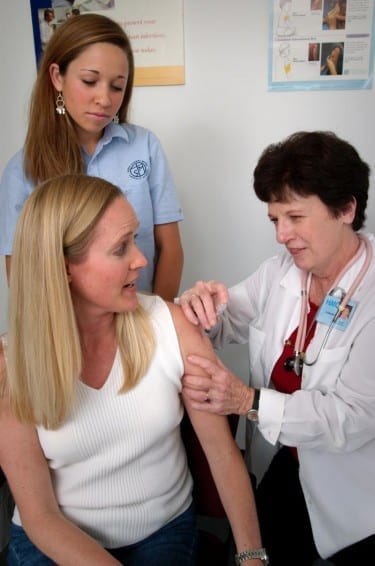
It’s not even cold season, yet there’s a major cough epidemic making news. This isn’t any normal cough; it can last up to three months and lead to pneumonia, convulsions, inflammation of the brain and even death.
Pertussis, commonly known as whooping cough, has experienced a resurgence. According to the CDC, 2012 saw the most cases of whooping cough in the United States in more than 50 years. Last month, California declared a whooping cough epidemic after 800 cases were reported in just two weeks.
Whooping cough is a bacterial infection that starts like a cold with a runny nose and cough. After a couple weeks the cough worsens and you experience severe coughing fits that make it difficult to breathe. The airways are so restricted that when you draw a breath between coughs, it makes a “whoop” noise, hence the name.
“The biggest risk for pertussis is in infants. Pertussis is part of the newborn series of vaccines, but children aren’t fully immunized until the last booster at five years old,” says Laura Delaney, M.P.A.S., PA-C, assistant professor in Des Moines University’s Physician Assistant Program. “The elderly may also be susceptible because of their weakened immune systems.”
Like the common cold, pertussis spreads through the air when someone coughs or sneezes. Delaney recommends taking the same precautions you would to prevent the spread of a cold, such as coughing into your elbow and washing your hands regularly.
With early recognition, whooping cough can be treated with antibiotics. However, antibiotics only make you noncontagious; they don’t lessen the cough. And symptoms may not show up for up to 10 days, the time when you’re most contagious. This makes whooping cough hard to detect and even harder to contain. Often, an entire household is treated to prevent the spread of the disease.
Vaccination remains the best defense against whooping cough. It is recommended that all adults have a tetanus, diphtheria and pertussis (Tdap) shot. Since protection can fade with time, pregnant women in their third trimester must get immunized for pertussis so they don’t pass it onto their child. Fathers, grandparents and all other caregivers should also be up-to-date with their vaccinations.
“As adults, we need to be cognizant of the fact that it’s dangerous to infants and protect them by getting immunized. If you haven’t been immunized, seek the advice of your health care provider,” advises Delaney.

